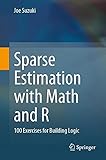Sparse Estimation with Math and R [electronic resource] : 100 Exercises for Building Logic /
Material type: TextPublisher: Singapore : Springer Nature Singapore : Imprint: Springer, 2021Edition: 1st ed. 2021Description: X, 234 p. 54 illus., 46 illus. in color. online resourceContent type:
TextPublisher: Singapore : Springer Nature Singapore : Imprint: Springer, 2021Edition: 1st ed. 2021Description: X, 234 p. 54 illus., 46 illus. in color. online resourceContent type: - text
- computer
- online resource
- 9789811614460
- 006.3 23
- Q334-342
- TA347.A78
Chapter 1: Linear Regression -- Chapter 2: Generalized Linear Regression -- Chapter 3: Group Lasso -- Chapter 4: Fused Lasso -- Chapter 5: Graphical Model -- Chapter 6: Matrix Decomposition -- Chapter 7: Multivariate Analysis.
The most crucial ability for machine learning and data science is mathematical logic for grasping their essence rather than knowledge and experience. This textbook approaches the essence of sparse estimation by considering math problems and building R programs. Each chapter introduces the notion of sparsity and provides procedures followed by mathematical derivations and source programs with examples of execution. To maximize readers’ insights into sparsity, mathematical proofs are presented for almost all propositions, and programs are described without depending on any packages. The book is carefully organized to provide the solutions to the exercises in each chapter so that readers can solve the total of 100 exercises by simply following the contents of each chapter. This textbook is suitable for an undergraduate or graduate course consisting of about 15 lectures (90 mins each). Written in an easy-to-follow and self-contained style, this book will also be perfect material for independent learning by data scientists, machine learning engineers, and researchers interested in linear regression, generalized linear lasso, group lasso, fused lasso, graphical models, matrix decomposition, and multivariate analysis.


There are no comments on this title.